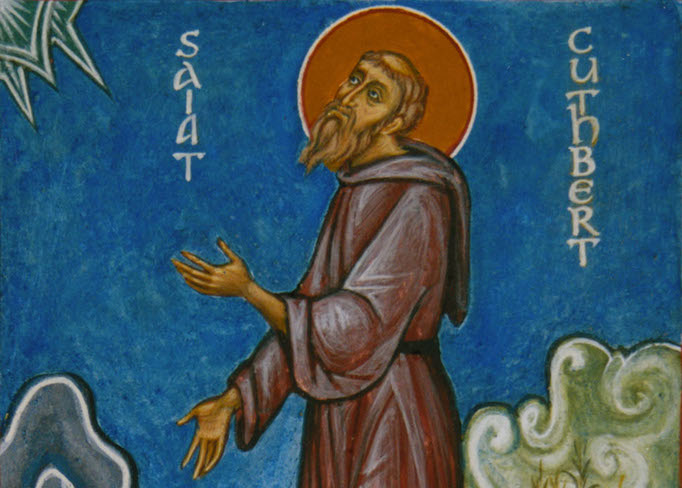
About the Commemoration
Cuthbert, the most popular saint of the preconquest Anglo-Saxon Church, was born about 625, probably in Northumbria. As a young man tending sheep one night, Bede reports, he had a vision of angels conducting a soul to heaven and later learned that St. Aidan had died that night. As a result of the vision, Cuthbert became a monk at Melrose and applied himself to prayer, study, and rigorous self-discipline.
In 661 he was appointed abbot of the monastery. It was a year of the plague, and Cuthbert made long journeys, bringing cheer to many, sacrificing himself for others, and impressing everyone he met with his gentleness and holiness of life.
He became prior of Lindisfarne in 664, but withdrew to live as a hermit at Fame for nine years. In 684 he reluctantly accepted the bishopric of Northumbria, and not long afterward, when he felt the approach of death, he withdrew to his hermitage on Fame. He died there on March 20,687. His remains were removed from Lindisfarne after the Viking raids began and eventually were interred in Durham cathedral; his bones were discovered in 1827 beneath the site of his medieval shrine.
He was a keenly observant man, interested in the ways of the birds and beasts. The ample sources for his life and character show a man of extraordinary charm and practical ability; Bede calls him “the child of God.”
Cuthbert is on the calendar in the Book of Common Prayer, he is not on the General Roman Calendar.
Excerpts from New Book of Festivals & Commemorations: A Proposed Common Calendar of Saints by Philip H. Pfatteicher, copyright, 2008 by Fortress Press, an imprint of Augsburg Fortress.
See also: Cuthbert
Reading
From Life of Cuthbert by the Venerable Bede
On Boisil’s death Cuthbert became prior, an office which he carried out for many years with holy zeal. Inside the monastery he counseled the monks on the religious life and set a high example of it himself, and outside, in the world, he strove to convert people for miles around from their foolish ways to a delight in the promised joys of heaven.
Many who had the faith had profaned it by their works. Even while the plague was raging some had forgotten the mystery conferred on them in baptism and had fled to idols, as though incantations or amulets or any other diabolical rubbish could possibly avail against a punishment sent by God the Creator. To bring back both kinds of sinners he often did the rounds of the villages, sometimes on horseback, more often on foot, preaching the way of truth to those who had gone astray….
Such was his skill in teaching, such his power of driving his lessons home, and so gloriously did his angelic countenance shine forth, that none dared keep back from him even the closest secrets of their hearts. They confessed every sin openly—indeed they thought he would know if they held anything back—and made amends by “fruits worthy of repentance,” as he commanded.
He made a point of searching out those steep rugged places in the hills which other preachers dreaded to visit because of their poverty and squalor. This, to him, was a labor of love. He was so keen to preach that sometimes he would be away for a whole week or a fortnight, or even a month, living with the rough hill folk, preaching and calling them heavenwards by his example.
Venerable Bede, Life of Cuthbert, chap. 9, trans. J. F. Webb, in The Age of Bede (Baltimore: Penguin, 1965), 54,55.
Propers
Almighty God, you called Cuthbert from following the flock to be a shepherd of your people: Mercifully grant that, as he sought in dangerous and remote places those who had erred and strayed from your ways, so we may seek the indifferent and the lost, and lead them back to you; through Jesus Christ our Lord, who lives and reigns with you and the Holy Spirit, one God, forever and ever.
A. C. Fraser, W. H. Frere, LFF
Readings: Psalm 23 or Psalm 1; 2 Corinthians 6:1-10; Matthew 6:24-33
Hymn of the Day: “The King of love my shepherd is” (H82 645,646; LBW 456, LSB 709, ELW 502)
Prayers: For the indifferent and those who no longer practice their religion; For a deeper understanding of the importance of prayer, meditation, and study; For the north of England, its church and people; For the cathedral and diocese of Durham.
Preface: Saint (2) (BCP)
Color: White
